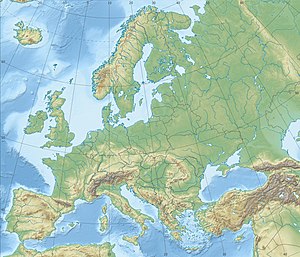
Back معركة كوبنهاغن (1801) Arabic Bitva u Kodaně Czech Slaget på Reden Danish Seeschlacht von Kopenhagen (1801) German Ναυμαχία της Κοπεγχάγης (1801) Greek Primera batalla de Copenhague Spanish Reidilahing Estonian Kööpenhaminan taistelu Finnish Bataille de Copenhague (1801) French קרב קופנהגן (1801) HE
| First Battle of Copenhagen | |||||||
|---|---|---|---|---|---|---|---|
| Part of the War of the Second Coalition and the English Wars | |||||||
 Battle of Copenhagen by Nicholas Pocock | |||||||
| |||||||
| Belligerents | |||||||
|
|
| ||||||
| Commanders and leaders | |||||||
| Strength | |||||||
|
| ||||||
| Casualties and losses | |||||||
| 3 ships of the line ran aground |
| ||||||
Location within Europe | |||||||

The Battle of Copenhagen of 1801 (Danish: Slaget på Reden, meaning "the battle of the roadstead [of Copenhagen Harbour]"), also known as the First Battle of Copenhagen to distinguish it from the Second Battle of Copenhagen in 1807, was a naval battle in which a British fleet fought and defeated a smaller force of the Dano-Norwegian Navy anchored near Copenhagen on 2 April 1801. The battle came about over British fears that the powerful Danish fleet would ally with France, and a breakdown in diplomatic communications on both sides.
As the British ships entered the harbour of the Danish Navy, several of its ships took up station at the harbour's roadstead, forming a blockade. The Danish fleet defended the capital with these ships and bastions on both sides of the harbour inlet.[3] It was the second attempt by the British to try to prevent a Franco-Danish alliance, as the British had already entered Øresund with a fleet in August 1800, in order to persuade Denmark not to ally with France. The Danes agreed to the British terms upon hearing news of the assassination of Tsar Paul I of Russia, as his death meant the end of the Russian-led League of Armed Neutrality of which Denmark was a member.[3]
- ^ Ole Lisberg Jensen, THE ROYAL DANISH NAVAL MUSEUM - An introduction to the History of the Royal Danish Navy Archived 7 April 2019 at the Wayback Machine
- ^ a b William James (1837). The Naval History of Great Britain. London: Richard Bentley. Retrieved 2012-03-16
- ^ a b part "Det danske søforsvar" at
